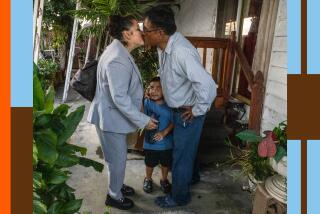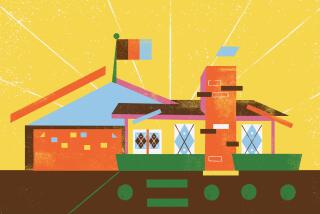Young Emigres Return to Work for Homeland : Lithuania: Groomed to defend their roots, those who fled to the West now intend to help shape history.
- Share via
VILNIUS, Soviet Union — For Carla Gruodis, being Lithuanian once meant missing the Saturday morning cartoon shows on television.
Born in Toronto to parents who fled their native Lithuania as children near the end of World War II, Gruodis, now 25, spent her Saturday mornings learning the history of her ancestral home and the complex grammar of its language at a special Lithuanian Catholic Church school.
She was not a willing student. “It was one of those things where they had to bribe us,” she recalled with a smile. “You know: ‘We’ll take you to McDonald’s afterwards.’ ”
But now the payoff has arrived for Gruodis and several other young, North American-Lithuanians like her who are putting their language and other skills to work here in service of Lithuania’s dramatic drive to restore its independence from Moscow.
“Things like this don’t happen back in Canada,” explained Darius Cuplinskas, 24, who, along with Gruodis and Chicago-born Edward Tuskenis, edits the Lithuanian Review. The Review is a new English-language newspaper published in the Soviet republic of Lithuania for emigrant Lithuanians, Soviet scholars, journalists and diplomats.
“This is a chance to play a role in history instead of just interpreting it or commenting on it,” added Cuplinskas, who majored in history and literary studies at the University of Toronto before coming to Lithuania last fall.
Reformers throughout Eastern Europe during this last, remarkable year of transformation have looked to the West and particularly to their respective emigrant communities for support.
In Czechoslovakia, those either expelled or hounded out of the country after the 1968 Soviet-led invasion began coming back in the first days of Prague’s “velvet revolution” last November and December.
In the Soviet Union, the reform programs of perestroika (restructuring) and glasnost (openness) have found supporters among such former outcasts and cultural giants as Mstislav Rostropovich.
But the response here is unusual in several respects. These young people are patriots of a nation they knew only secondhand. Some had never even visited Lithuania until now. And even though only in their 20s, they have quickly achieved positions of real influence.
Chicagoan Rita Dapkus, 28, has just taken over as director of the Sajudis Press Agency, the news and information service of Lithuania’s two-year-old mass reform movement of the same name.
Aidas Palubinskas, 20, a native of Lakewood, Calif., is active in Lithuania’s recently revived Christian Democratic political party.
The fact that these North American-Lithuanians have decided to devote at least a substantial period of their young lives to their ancestral homeland is most of all testimony to the strong sense of cultural identity among so many Lithuanian emigrant communities.
In that, they are more like the young Western Jews who emigrate to Israel than others who are going back to the fledgling new democracies of Eastern Europe.
“My parents raised me to understand that, not only do I have to work for Lithuania’s independence in the States, but also, when it becomes independent, I have to go back not only to live, but to help rebuild,” Palubinskas said.
These young people spoke Lithuanian in their homes. They may have picked up some English in the streets, but some spoke virtually none at all until they were in kindergarten. They recall their young lives as centered around their respective emigrant community’s church, with its grammar lessons, Scout troops, summer camps and folk dance groups.
Some got involved in politics very young. Cuplinskas, for example, was president of the Amnesty International chapter at his university, and active enough in the cause that he was twice denied visas to visit Lithuania.
Gruodis described herself as from “a kind of lefty student journalism background,” which sharpened her interest in the women’s movement.
In Lithuania, they mostly throw themselves into the cause, try to ignore the hardships of everyday life and try not spend too much time worrying about the future.
They came here mostly on student visas, although their “classrooms” turned out to be mostly the cluttered offices and smoke-filled rooms where amateur Lithuanian politicians are trying to become professional.
Asked how she viewed her role, Dapkus looked slightly taken aback. “To tell you the truth, I don’t think about it,” she said between phone calls to her shared, fourth-floor office at Sajudis headquarters.
“I guess nuns kind of devote themselves to religion, and I devote myself to this,” Dapkus added. “It’s almost as if I don’t exist as an individual.”
“The newspaper is perfect for the kind of thing we want to do--to use our skills to assist the process here,” commented Gruodis, who is listed on the masthead as editor in chief of the Lithuanian Review.
“We’re all very devoted to helping the revolution, but on the other hand it’s incredibly interesting work for us. . . . I’m probably making some of the most important contacts and friendships of my life right now.”
Gruodis said she feels “more at home here than I felt in Canada. I just know I want to be here. I really like it.”
At the same time, however, she notes that if it all goes wrong somehow--if Moscow cracks down--the native Lithuanians have far more to lose than she does. It would be hard, she said, but she could return to life in the West.
Others want to go back to North America, at least to continue their education, or perhaps to split their time between their two “homes.”
Palubinskas said he wants to finish his undergraduate work at Chicago’s Loyola University, and then go on to a master’s and a doctorate in international relations. “I’d like to be a diplomat--or the foreign minister of Lithuania,” he said.
More to Read
Sign up for Essential California
The most important California stories and recommendations in your inbox every morning.
You may occasionally receive promotional content from the Los Angeles Times.










